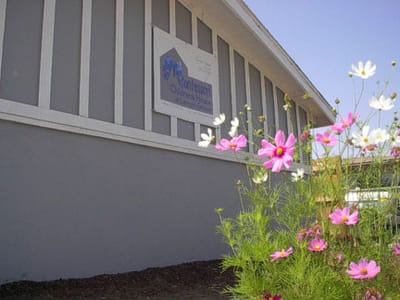A Montessori preschool experience,
in a welcoming home-like environment
Our Teachers
 Ms. DeniseOwner and director Mary Denise Duppée received her Montessori Early Childhood Education Certificate through a MACTE-accredited center in 1994 and worked in Montessori preschools in San Diego and El Cajon for over a decade before opening MCHLG.
Ms. DeniseOwner and director Mary Denise Duppée received her Montessori Early Childhood Education Certificate through a MACTE-accredited center in 1994 and worked in Montessori preschools in San Diego and El Cajon for over a decade before opening MCHLG. She continued her education by completing Montessori Philosophy and Methods of Child Development through the Extended Studies Program at UCSD.
Ms. Denise holds a degree in Photography from the Art Institute of Pittsburgh. In 2014, she became a Certified Barton Reading and Spelling Tutor for individuals with dyslexia, as well as a Dyslexia Screener and Consultant. She is a member of the American Montessori Society (AMS), the International Dyslexia Association (IDA), and Children and Adults with Attention-Deficit/Hyperactivity Disorder (CHADD).
 Ms. Sophia
Ms. SophiaMs. Sophia has a BA in Child Development from Point Loma Nazarene University and received her Montessori Early Childhood Education Certificate through a MACTE-accredited center in 2025. She worked in the classroom as part of her high school internship for her Child Development pathway and continued teaching while attending university. Ms. Sophia is a member of the American Montessori Society (AMS).
Our School

Our school uses the Montessori Methodology and Philosophy with fidelity.
- The classroom is dynamic, child-led, and fosters independence.
- It comprises mixed-aged children and incorporates a three-hour work period.
- We are educated in Early Childhood Education and hold a BA in Child Development.
- We are certified in Montessori Early Childhood Education through a MACTE-accredited center.
MCHLG holds a Large Family Child Care License under the California Department of Social Services, license #376614702. Under our license, attendance is limited to 12 students per day, resulting in a 1:6 student-to-teacher ratio, which allows for a small, cozy, and home-like classroom environment. Our classroom is a lovely environment for our 2-year-olds, who are experiencing their first school setting, and it enables our older children to provide leadership and guidance as they continue their individualized learning.
Our license also allows for children who are not yet using the toilet and still require diapers or pull-ups, and we help with transitioning to bathroom independence when they are ready.
- Teachers and assistants have current EMSA-approved and OSHA-compliant CPR-AED and First Aid certifications for adults, children, and infants (pediatric). These require the full 8-hour accreditation every two years.
- Teachers, assistants, and all household members have received Fingerprint Clearance through the Department of Justice.
- Under Health and Safety Code 1596.8662, teachers and assistants have completed Mandated Reporter training for their duties as reporters of the California Child Abuse & Neglect Reporting Act.
- As required by Employee and Volunteer Immunization Code 1597.622, teachers and assistants have documentation of immunization against pertussis, measles, and influenza..
Montessori Method
The name “Montessori” is from Dr. Maria Montessori, the first female Doctor of Medicine in Italy, who lived from 1870 to 1952. Dr. Montessori developed her unique educational method through her work with children, known as the Montessori Method, which is both a philosophy of child development and a rationale for guiding such growth. Children’s developmental needs are fostered through freedom within limits in a carefully prepared environment, which ensures exposure to a variety of materials and experiences.
The main premises of Montessori education are:
- Children possess an unusual sensitivity and intellectual ability to absorb and learn from their environment, unlike adults in terms of both quality and capacity.
- The most critical years of a child’s growth are the first six years, during which their unconscious learning comes to a conscious level.
"Never help a child with a task at which he feels he can succeed." -Maria Montessori.
The Whole Child Approach: The primary goal of a Montessori program is to help children reach their full potential in all areas of life. Activities promote the development of social skills, emotional growth, physical coordination, and mental preparation.
The Prepared Environment: In the self-directed classroom, the whole learning environment (classroom, materials, and social setting) must support the children.
The Montessori Materials: Dr. Montessori’s observations led her to design several multi-sensory, sequential, and self-correcting materials to facilitate learning.
The Teacher: The Montessori teacher meticulously observes each child’s behavior and growth. Based on this observation, the teacher guides the child in an environment designed to meet the child's needs. Montessori credentialing requires years of extensive training and education.
Dr. Montessori has significantly impacted education and the way we understand and teach children today. Her influence can be seen not only in the number of schools that bear her name but throughout child care, education, and development.
Current concepts such as individualized learning and readiness programs, manipulative learning, ungraded classes, combined age groups, team teaching, and open classrooms reflect many of her early insights.
Classroom
Practical Life
Practical Life promotes self-care, environmental care, grace and courtesy exercises, and refinement of physical movement and coordination.
Sensorial
The Sensorial materials enable the child to order, classify, and describe sensory impressions in relation to length, width, temperature, mass, color, etc.
Math
The Montessori math materials, using concrete manipulatives, allow the child to internalize the concepts of number, symbol, sequence, operations, and memorization of basis facts.
Language
The language work includes oral language development, pre-reading work, reading, writing, and children’s literature.
Hours & Tuition
SCHOOL HOURS
| Morning Arrival between 8:00-8:30 |
| Afternoon Dismissal between 2:30-2:45 |
AFTERSCHOOL CARE
| Afterschool care is not offered on a consistent basis. Occasional care can be scheduled with advance notice and is billed at $3 per 15 minutes. |
DAYS OF OPERATION
The school is open Monday-Thursday and is closed on Fridays.
The School Year is from the last week of August through the 3rd week of June.
- MCHLG observes most legal holidays and is closed for two weeks for Winter Break and one week for Spring Break. Also, MCHLG is closed for one week at the end of the School Year and two weeks at the end of Summer Camp.
Summer Camp is for six weeks, starting at the beginning of July.
TUITION
The School Year tuition is a yearly rate divided into ten monthly payments for convenience.
| 4 Days | M-Th | $9,180 yearly ten monthly payments of $918 Total days of school: 155 |
| 3 Days | combination w/ Mondays | $7,960 yearly ten monthly payments of $796 Total days of school: 116 |
| 3 Days | combination w/o Mondays | $8,170 yearly ten monthly payments of $817 Total days of school: 119 |
| 2 Days | T/Th | $6,370 yearly ten monthly payments of $637 |
The Summer Camp tuition is $275 per week or $55 daily.
Visit

- Open Enrollment begins in April for the Upcoming School Year.
- A school visit is required to be added to the waitlist.
- Think ahead! Our school fills up quickly.
Review
Please review this website. It offers information on school hours, calendar, location, pricing, and, most importantly, the Montessori Methodology.
Visit
You can schedule a tour for your family.
Questions?
Our website is extensive, but if you don’t find the answer to your question, use the Question form to let us know.
Please note: we do not allow unannounced “walk-in” visits. Prospective parents must make an appointment to visit the school.
However, parents with children currently enrolled in our school have the legal right to enter the school unannounced at any time. This is the law, but it would be our policy regardless.
Annual visits from state licensing and safety inspections from the fire department are always unannounced. When they arrive, they have complete access to the school.
Questions?
- 8121 Braddock Place, San Diego, CA 92114
- Arrival between 8:00-8:30am Dismissal between 2:30-2:45pm The school is open Monday-Thursday and is closed on Fridays Afterschool care is not offered consistently. Occasional care can be scheduled with advance notice and is billed at $3 per 15 minutes.
FAQ
Can my child attend if they are still using diapers or pull-ups?
- Yes!! Our license also allows for children who still require the use of diapers or pull-up, and we help with transitioning to bathroom independence when they are ready.
How old does my child need to be to attend?
- We accept children 2 to 5 years old.
What are the school hours?
- Our hours are arrival between 8:00-8:30am and dismissal between 2:30-2:45pm.
Do you offer afterschool care?
- Afterschool care is not offered on a consistent basis. Occasional care can be scheduled with advance notice and is billed at $3 per 15 minutes.
My child does not have all or some of their vaccinations. Can they still attend?
- You must have documentation of your child’s up-to-date immunizations.
- There are no exceptions to this rule.
- 3 Polio
- 4 Diphtheria, Tetanus, and Pertussis (DTaP)
- 3 Hepatitis B
- 1 Measles, Mumps, and Rubella (MMR) on or after the 1st birthday
- 1 Haemophilus influenza type b (Hib) on or after the 1st birthday
- 1 Varicella (chickenpox)
How many children are in the classroom?
- We are licensed for 12 children per day.
What is the teacher-student ratio?
- The teacher-student ratio is 1:6.
How many classrooms are in the school?
- We have one mixed-age classroom.
Does my child bring their lunch?
- Yes. Children bring a packed lunch from home. Look at our Parent Handbook for some lunch ideas.
Why does it say parents can't visit the school? I want access to my child.
- If your child is enrolled at the school, you can enter the school any time you want. This is your legal right.
- However, we do not allow unannounced "walk-in" visits from prospective parents. Those parents must make an appointment to visit the school.
What is the school email?
Do you have a favorite dinosaur?
School Year Calendar
Enrollment Forms
Welcome!
When it's time for you to enroll, please use the forms available in the links below. You will return the completed forms, the $250 non-refundable registration and insurance fee, and your child’s Yellow Immunization card to the school. (Checks payable to Mary Denise Duppée.)Your child MUST be up to date with all required immunizations to enroll in our school.
Required Immunizations.pdf
1 2025-2026 Enrollment Agreement and Registration MTWTh.pdf
2 COVID-19 Waiver (rev. 2022 March).pdf
3 Consent For Emergency Medical Treatment (LIC627).pdf
4 Identification and Emergency Information Form (LIC700).pdf
5 Notification of Parents' Rights (LIC995A) (Y).pdf
6 Release for Electronic Student Work Photograph Video.pdf
7 Parent Notification Additional Children (LIC9150).pdf
8a Receipt of Effects of Lead Exposure.pdf
Here are links for the paperwork for you to keep:
8b Effects of Lead Exposure CDSS.pdf
9 2025-2026 School Year Calendar.pdf
10 Family Child Care Consumer Awareness Info. (LIC9212).pdf
11 Daily Schedule.pdf
12 Caregiver Background Check (LIC995E).pdf
13 Parent Handbook (revised 3-2024).pdf
Military Families
NACCRRA APPROVED 
Montessori Children’s House of Lemon Grove is proud to have met the qualifications required by the National Association of Child Care Resource and Referral Agencies (NACCRRA) under Child Care Aware® of America for our Military Families. This is a testament to our unwavering commitment to excellence.
Please note: While Montessori Children’s House of Lemon Grove made considerable effort to receive these certifications, we are not affiliated with the military. Any aid received will be applied to tuition, but tuition is due in full regardless of whether your request for fee assistance is granted.
- For information about these programs, visit Home - Child Care Aware® of America
- Our provider ID is 460324.

